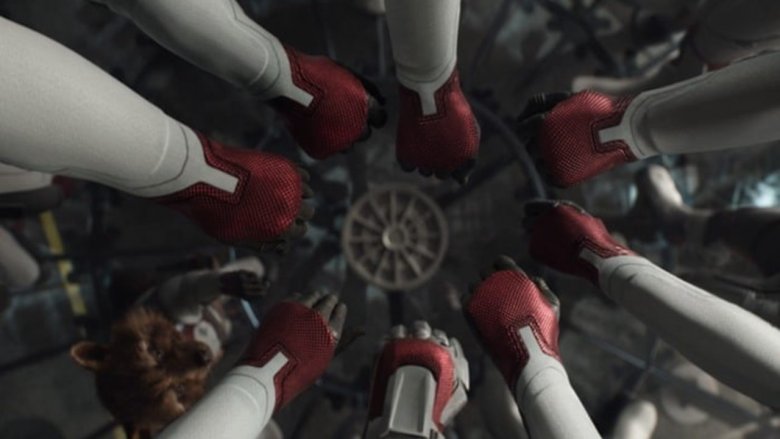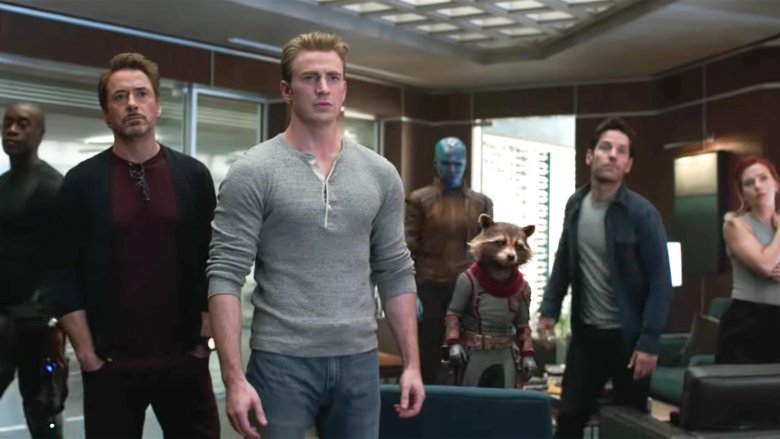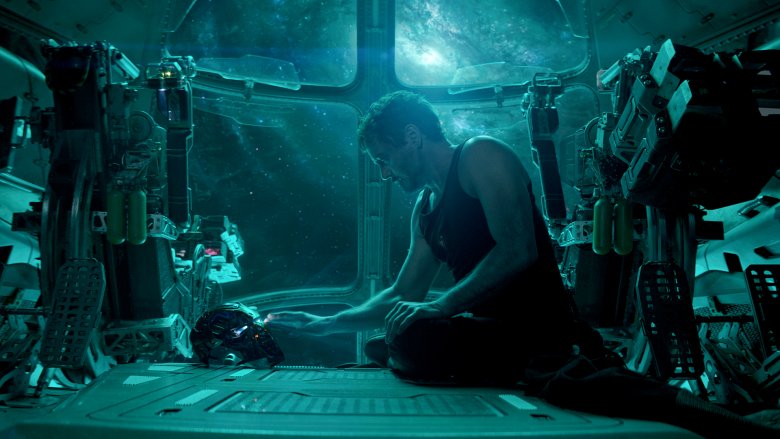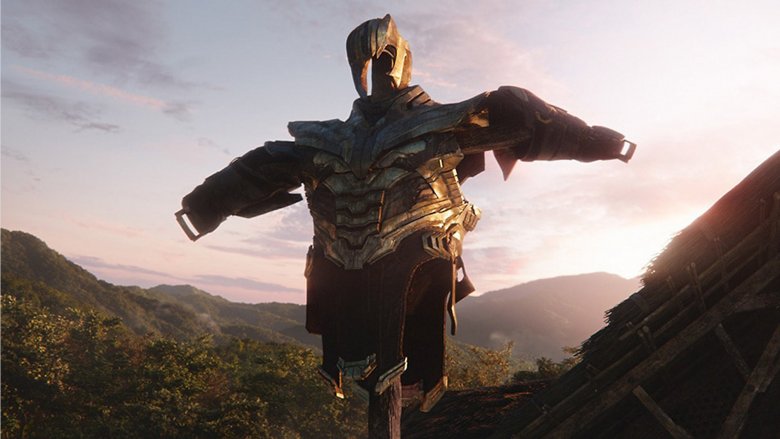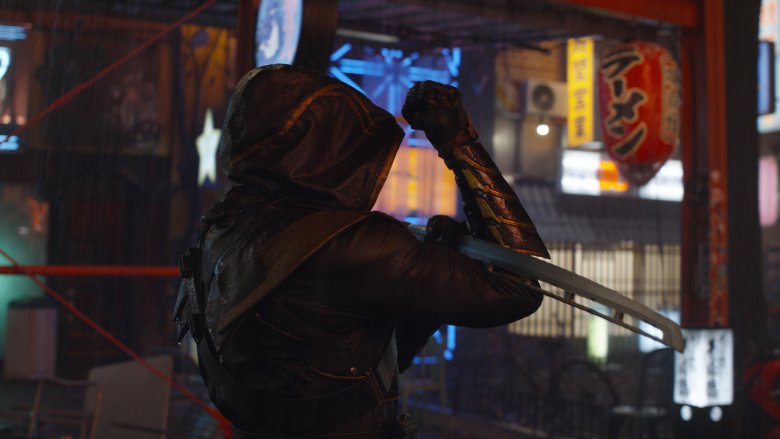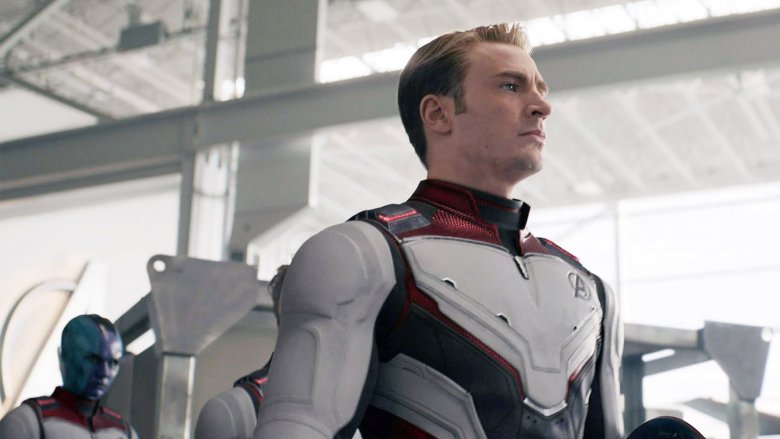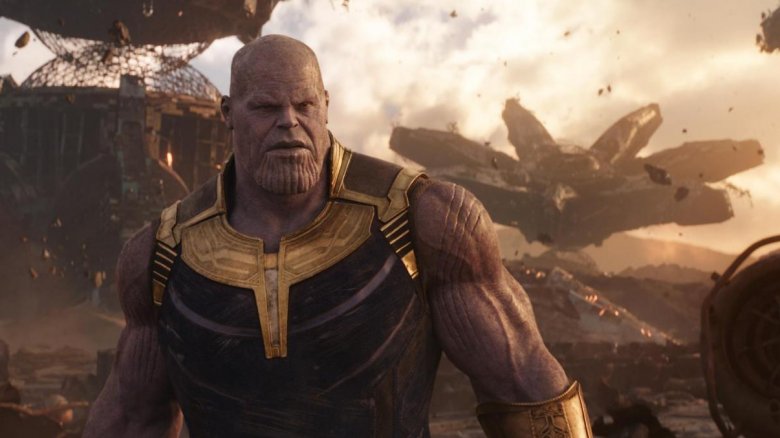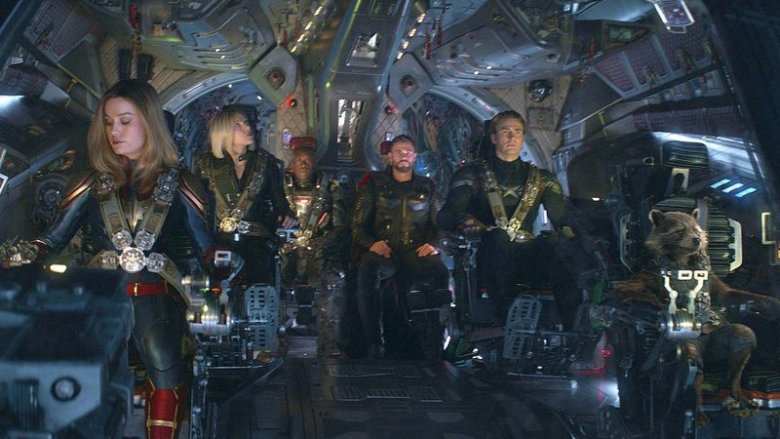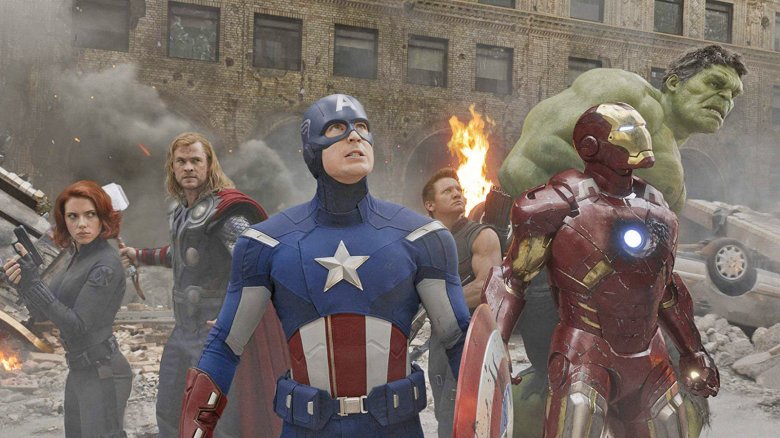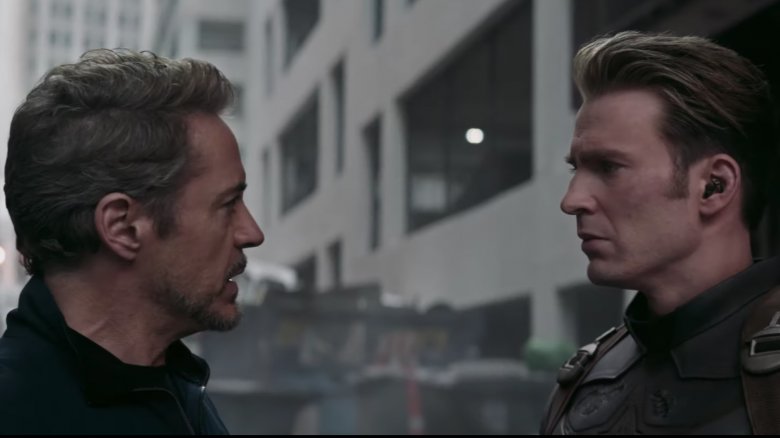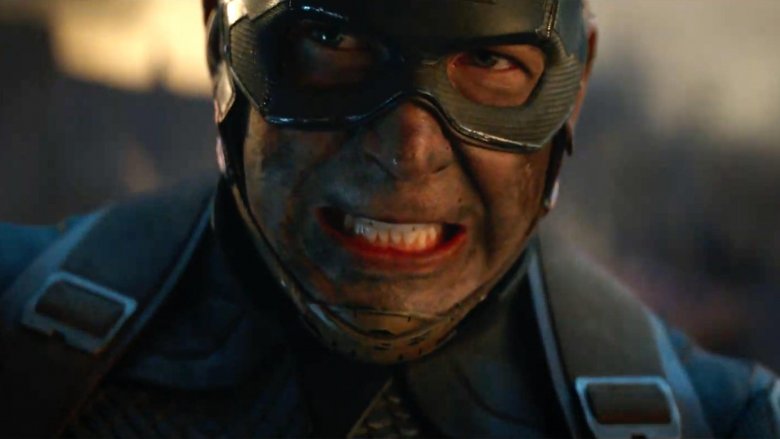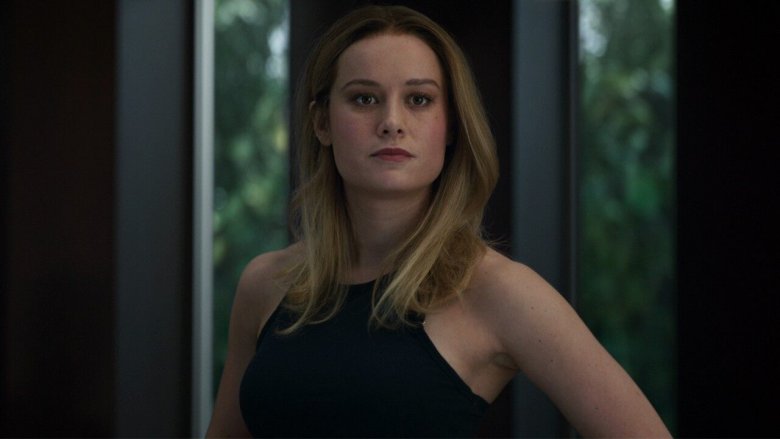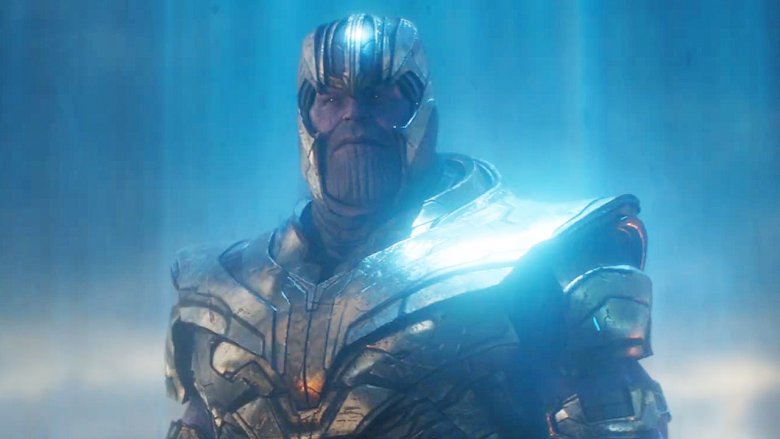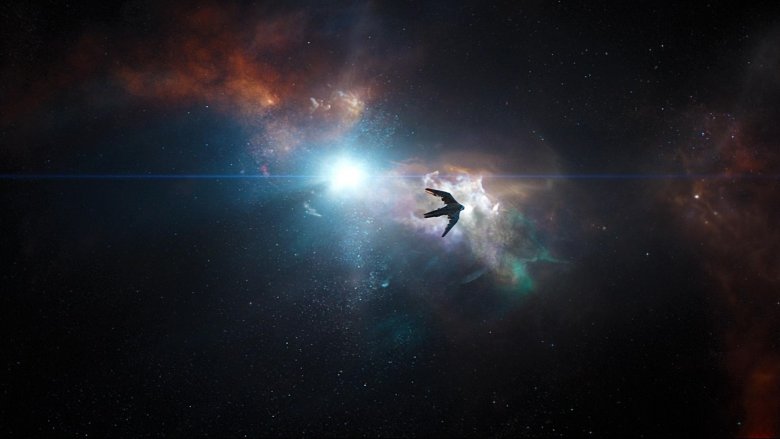Why Endgame Blew Everyone Away At The Box Office
Avengers: Endgame started breaking records long before it lit up theater marquees. From a gargantuan budget to unprecedented ticket pre-sales, there was little doubt that Marvel's star-studded capstone project would do blockbuster business — and true to form, when it finally arrived, the film was a critically acclaimed smash hit.
All of which is to say that it came as no surprise when the record-breaking opening weekend numbers started rolling in. By Friday's end, the film had brought in a single-day all-time high of $157 million in North America alone. The numbers were just as stunning overseas, where Avengers: Endgame's Wednesday to Friday total came close to the half-billion mark.
By the end of the weekend, the movie's worldwide total had risen to a mind-boggling $1.2 billion — the largest opening weekend to date, nearly doubling the previous record, which was held by Endgame's predecessor, Avengers: Infinity War. Let's break down some of the primary reasons that this Marvel phenomenon did so unbelievably well at the box office on its opening weekend. Spoilers ahead!
A global phenomenon
Blockbuster movies are global events these days — increasingly, moderate ticket sales in the U.S. can be salvaged once the global figures get added in. That's what saved 2019's Alita: Battle Angel, to name just one example. That being said, it was immediately and abundantly apparent that Avengers: Endgame was ready to break the box office with or without the help of the global tally.
By the end of its opening weekend, the film made $358 million in North America alone. That's nearly the same amount Alita: Battle Angel made in the entire previous two months (according to Box Office Mojo). To put it another way, by Sunday, nearly 40 million tickets were sold for Endgame.
Audience demand around the globe was clearly a critical factor in launching the fourth Avengers film to such astronomically huge numbers. But there's also no doubt that the North American fanbase was out in droves, and it gave Endgame the kind of opening weekend boost that filmmakers dream of.
How about those pre-sales?
Again, it was no surprise that Endgame conquered the box office — and not just because Marvel movies cross the billion-dollar mark on a regular basis. Starting in the early morning hours of April 2, when Marvel opened pre-sales, fans flooded ticket sites and apps in an attempt to pin down the best seats possible... and broke the sites in the process. Fandango even had a queue set up for anxious buyers as they waited for their turn to nab a seat.
Before the end of the day, Endgame had already elevated the bar for demonstrating pent-up audience demand. Fandango's first-day pre-sales record was shattered in a mere six hours — and that was just the beginning. CNBC reported that the film sold more on Atom Tickets in the first week than Aquaman, Star Wars: The Last Jedi, Avengers: Infinity War, and Captain Marvel combined — in fact, it doubled their collective total. Clearly, to say that the film was set up for a massive opening weekend success would be an understatement.
A marketing Marvel
Of course, fans didn't race online to buy tickets and break the internet simply on a whim — they'd been primed by months of exorbitantly expensive marketing. The production budget alone was reportedly a whopping $350-$400 million, and according to Deadline, Endgame's promotional budget surpassed $200 million. Everyone was aware of the film's impending release.
Most impressively of all, Marvel did it all without giving much of anything away. Months before Endgame's release, studio chief Kevin Feige hinted that the footage seen in the trailers was mostly from the first 15 or 20 minutes of the movie — which ended up being more or less true. The approach was groundbreaking, especially for tentpole films of this magnitude, which usually showcase a few snippets from the climax of the storyline to help draw in the crowds. Directors Anthony and Joe Russo even took things a step further by making it clear early on that they weren't afraid to bend the truth and straight up lie if it helped to maintain the element of surprise.
Incredible anticipation
The fact that the Russos were willing to go so far to keep the movie's surprises under wraps built a huge sense of anticipation that clearly fed into Endgame's box office success. The brothers had already infamously inserted Hulk into the Infinity War trailers when he wasn't there. This naturally left everyone guessing which ways the directors had gone about setting up misdirects in the Endgame footage this time around.
The knowledge that they were being misled in the name of an unblemished first viewing experience brought fans flocking to theaters at the earliest possible opportunity. The fact that at any moment the carefully guarded secret of the film's story could be ruined by a random Google search or unfiltered social media feed added a natural sense of urgency. The Russos even posted a letter imploring "the greatest fans in the world" to preserve the mystery and not spoil it for others. The letter included the hashtag #DontSpoilTheEndgame, which harkened back to their #ThanosDemandsYourSilence secrecy campaign.
The collective fervor surrounding the preservation of the movie's surprise was so complete that when spoilers inevitably started to surface in the days before the premiere, numerous news outlets closed ranks to warn fans rather than help propagate the leaks, while the fans themselves temporarily abandoned social media in an attempt to avoid ruining the experience.
Stellar initial reviews
A final piece of the marketing puzzle that was perfectly in place in the lead up to Avengers: Endgame's opening weekend was the hype created by the initial reviews. The world premiere came on Monday, April 22, at the Los Angeles Convention Center, and the entire event felt like a huge, fan-crazed party, as the actors and production team did their best to answer interview questions without spoiling the film.
The following days saw countless articles sharing the overwhelmingly positive first reactions. The feedback constantly emphasized the fact that the film was exquisitely emotional, awe-inspiringly epic, unbelievably satisfying, and sublimely cathartic. Countless reviews also pointed out that nearly everyone cried at some point. The reactions left fans foaming at the mouth as opening weekend crept nearer.
The final act
There's no doubt that the stakes were high heading into Endgame. The closure that the film was poised to bring was a particularly important element in more than one way.
First, there was the obvious. One way or another, Endgame was going to bring some finality to the Thanos storyline. After all, every story has an ending. Ever since the Mad Titan snapped his gauntleted fingers, the world had been waiting with bated breath to see how the conclusion to the story would play out... and if or how the snap could be reversed. Endgame had a million things going in its favor already, but the fact that it was the second act in a two-part story that everyone wanted to see resolved gave it a huge boost going into opening weekend.
But beyond the conclusion to the two-part Infinity War story, Endgame also finalized what Kevin Feige defined as the "Infinity Saga," which is the studio's name for the collective story arc of the first 22 movies in the MCU. The movies all led, one way or another, to one ultimate conclusion: Avengers: Endgame. The knowledge that the fourth Avengers film wasn't just a sequel to Infinity War but also the finale of the entire Infinity Saga only added fuel to the fire leading up to the film's release.
Crossover appeal
Endgame had another natural attraction: crossover appeal. The sheer number of fan favorite personalities involved in the fourth Avengers installment was off the charts. It felt like Marvel Studios rolled up all of its preceding movies into one gigantic potluck of celebrity star power. No matter who your favorite character in the MCU might be, chances are you had a chance to see them getting in on the action in Endgame.
Of course, having big names in a film doesn't automatically translate to box office success. But each major character involved in the story is near and dear to millions of fans, all of whom were dying to answer the high-stakes question of whether their favorite hero would survive the Endgame. That burning desire to know guaranteed that every Marvel fan had a reason to buy a ticket over opening weekend.
The big six
Avengers: Endgame boasts a packed cast, but few personalities were of more interest on opening weekend than the original six Avengers — Iron Man, Captain America, Thor, Hulk, Black Widow, and Hawkeye. The "Big Six" started it all in Phase 1, which focused on the origins of many of the characters and traced the path they took to come together in the first Avengers film.
While the Avengers' storyline has clearly grown beyond the original six since, with characters like Scarlet Witch, Vision, Falcon, and even Spider-Man joining the team, the story of the Avengers still revolves around this core crew. And while each character has had his or her own story arc throughout the MCU, the group has also blazed its own unique trail.
From their unlikely assembling by Nick Fury to their showdown with Ultron and then on through their inner discord in Civil War, this band of heroes has run a difficult gauntlet. Going into Endgame, the desire to see what happened to them was just as big of a draw as the storyline for any individual character.
Cap and Stark finally meet
One of the biggest question marks on the Avengers franchise before Endgame reached theaters was the question of if and when Steve Rogers and Tony Stark would finally be in the same room again. This pair of leaders had been bitterly at odds ever since Captain America: Civil War... three years before Endgame premiered.
While everyone has a critical part to play on the team, Captain America and Iron Man always served as the respective heart and brains of the operation. The fallout between the two remained an unresolved blight on the entire third phase of the MCU. Even when a resolution seemed inevitable as the threat of Thanos loomed throughout Infinity War, the two never reunited onscreen.
The tortuously avoided reunion wasn't left out of that film on purpose. As Infinity War writer Stephen McFeely explained, a Cap-Tony reunion was actually in an initial draft, but it had to be dropped. Endgame picked up the ball by directly addressing the reconciliation — which was a near certainty at this point — but it didn't change the fact that fans were filling seats partly with expectations of finally seeing a belated burying of the hatchet take place.
Bowing out
As the Endgame bonanza crept closer and closer, the rumor mill pumped out a continual stream of theories guessing at which member or members of the team wouldn't survive Thanos the second time around. Fans quickly noted that all six of the original team members survived the snap at the end of Infinity War. This conspicuously left them in the limelight for the final act. With the Russos making it clear that the stakes were very real heading into Endgame, the question became who would ultimately bow out of the franchise by the time the credits rolled.
Hulk and Thor were regularly discussed in the conversation of who would get the axe (at least metaphorically speaking), but it ended up being three other characters that exited stage left. Black Widow's sacrifice for the Soul Stone may have been a bit unexpected, but Iron Man's death and Cap's retirement were both long-discussed elements that brought their storylines to satisfying conclusions — conclusions that fans started filling up theaters from day one to see play out.
Finding a worthy opponent
A significant portion of Avengers: Endgame is understandably focused on the original six Avengers, but that still leaves plenty of time for characters like Rocket, Ant-Man, and War Machine to get some screentime. While those three may be familiar faces at this point, there was one brand new member of the MCU ready to jump right in on the action: Captain Marvel, who'd already blown up theaters with her successful debut less than two months before Endgame was released.
Captain Marvel is a fun, well-made movie, but it left a bit to be desired in the villain department. As Carol Danvers increasingly flexed her superhero muscle it became abundantly clear that nothing on Earth — and few things off of it — were going to be a match for her... until Thanos arrived on the scene. After watching the Mad Titan steamroll every hero in his path in Infinity War, the idea of seeing the overpowered Captain Marvel finally go up against a villain that actually had some muscle of his own to match was intriguing, to say the least.
Thanos
Of course, one of the biggest draws for Endgame was Thanos himself. The galactic super-villain was able to claim a catastrophic victory in Infinity War, and everyone was dying to see how he'd fare in the second act. While characters like Thor and Doctor Strange may have given him a run for his money, every Infinity Stone that he gathered made the Mad Titan that much harder to beat until, by the end of the movie, Thanos had won, no questions asked.
Infinity War ended on a dark and uncertain note, but studio chief Kevin Feige pointed out during the Endgame premiere that "some people call Infinity War a cliffhanger, we call it 'No, just, Thanos won.' And he was very content at the end of that movie... his journey was complete there." The truth is, the big purple guy ran the table in Infinity War. He delivered a shattering defeat to the Avengers, and it's no wonder the world was eager to see how Thanos' story concluded in the sequel.
Setting up the next step
Endgame is focused on wrapping up the major story arc that unraveled over the first three phases of the MCU, but just because the movie provides closure for characters like Captain America and Iron Man doesn't mean it didn't have other work to do. The MCU is far from over, after all. By the time Endgame arrived, an entire new slate of films was already planned out — and the Disney-Fox merger heralded the eventual arrival of characters like the X-Men and Fantastic Four into Marvel's ever-expanding universe.
Marvel has been typically tight-lipped about its plans for the future, but it seems clear that the MCU's next phase will revolve at least partly around characters like Black Panther, Captain Marvel, Doctor Strange, Spider-Man, and the Guardians of the Galaxy — many of whom were dusted at the end of Infinity War. Moviegoers thronged to theaters on opening weekend to see some closure for the original Avengers, but there was also the added bonus of seeing how all the fallen heroes would be brought back and set up for the future.
All in all, the number of factors sending fans to their local theaters opening weekend ensured Endgame would be a success — and what a success it was. It'll be almost impossible for Marvel to surpass the incredible achievements of the Infinity Saga, but much like the Avengers themselves, the studio has overcome seemingly insurmountable odds so many times that it'd be foolish to bet against them.
